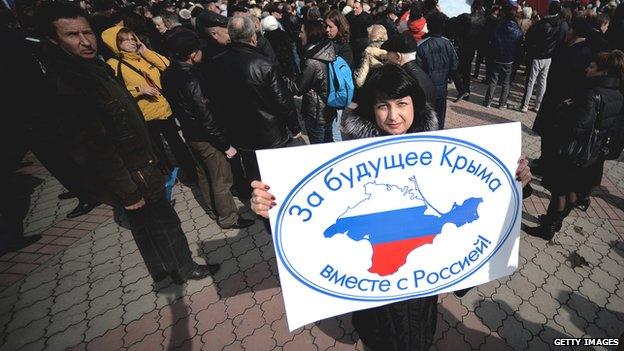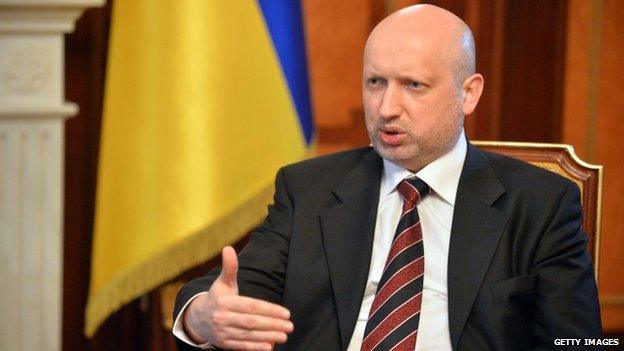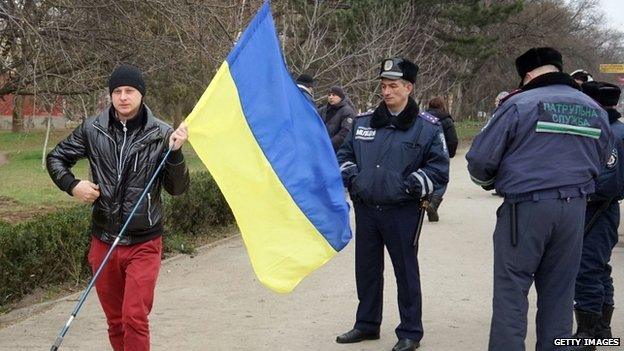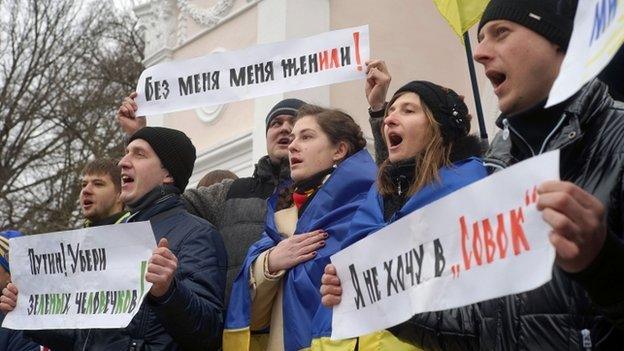Is Crimea's referendum legal?
- Published

This sign in Crimea reads: "For Crimea's future with Russia"
On Sunday, Crimeans will vote on whether they want their autonomous republic to break away from Ukraine and join Russia.
Ukraine and the West have dismissed the referendum as illegal and one that will be held at gunpoint, but Russia supports it.

Why is this referendum being held?
Crimea's parliament has elected a pro-Russian prime minister and voted to break away from Ukraine, following the ousting of Ukrainian President Viktor Yanukovych by pro-Western and nationalist protesters. The referendum is designed to show public endorsement for the decision.
Parliament says it needs to protect Crimeans from "extremists" who came to power in Kiev and now threaten their lives as well as the right to speak the Russian language.
But the new government in Kiev says the referendum is being held to legitimise the presence of Russian troops in Crimea and its annexation to Russia.

What will people see on the ballot?
There are two questions being put to the vote:
1. Are you in favour of the Autonomous Republic of Crimea reuniting with Russia as a constituent part of the Russian Federation?
2. Are you in favour of restoring the Constitution of the Republic of Crimea of 1992 and of Crimea's status as part of Ukraine?
However, the referendum rules do not state whether there is a threshold number of votes needed for the result to be enacted.

What does Ukraine say?

Ukraine's interim President Oleksandr Turchynov
It has called for a boycott of the vote, which it says would be illegal.
Ukraine's interim President Oleksandr Turchynov annulled the Crimean parliament's decision to hold the vote and pledged to disband the republic's legislature.
Kiev has issued arrest warrants for Crimean parliament speaker Volodymyr Konstantynov and Prime Minister Sergei Aksyonov on charges of attempting to seize state power.
But since pro-Russian forces are in control in Crimea, Ukraine is not in a position to stop the referendum going forward.

What does the outside world think?
Western leaders have branded the poll illegal. US President Barack Obama has called it a "slapdash" vote which "ignores" the constitution. The leaders of the G7 industrialised nations said they would not recognise the outcome of the vote.
But President Vladimir Putin said the referendum is "based on international law".
Russia's parliament has said it will respect the outcome of the vote and is considering a bill on a procedure to admit parts of a foreign state to Russia.

Who can vote?

Pro-Ukrainian supporter in Simferopol
According to the provisional rules approved by the Crimean parliament, Ukrainian citizens aged 18 or older and registered as residents of Crimea can vote.
They must produce a Ukrainian passport or any other identification document issued by the migration service. The referendum rules make no mention of Russian passports. Some residents of Crimea are believed to hold both Ukrainian and Russian passports, contrary to Ukrainian legislation.
But Ukraine has blocked Crimean officials' access to voter lists, so the electoral rolls will have to be compiled by local councils all over Crimea.

What kind of campaign is going on?

The lower banners read, "Putin take away the green man" (L) and "I don't want Soviet" (R)
Ukrainian citizens registered in Crimea are "free to discuss the referendum questions" and to campaign in public, according to the rules.
But campaigning has been almost entirely pro-Russian, often featuring swastikas to portray the authorities in Kiev as neo-Nazis. Shortly after the referendum was called, Ukrainian TV channels were removed from both terrestrial broadcasts and cable networks in Crimea. Some of them were replaced with Russian stations.
There have also been reports of violence against pro-Ukrainian activists.

Will there be observers?
The Crimean parliament has formally invited OSCE election monitors, but the OSCE does not plan to send any because of its stance that the vote is "illegal".
Military observers from the OSCE have already been blocked from entering Crimea - on 8 March, shots were fired by pro-Russian troops.
Russia plans to send 24 MPs to observe the referendum and eight election officials to oversee the vote.

What is the likely outcome?

With pro-Russian forces firmly in control of Crimea politically and militarily, the result seems to be a foregone conclusion in favour of Crimea being incorporated into Russia.
Crimean parliament speaker Volodymyr Konstantynov said it was merely a matter of "legalising" opinion which was already known. "There will be no surprises. Do not even hope," he said on Ukrainian TV.
Ethnic Russians make up a majority of Crimea's population (58%), according to the last census, which was taken 13 years ago. Ukrainians are estimated at 24% and Crimean Tatars at 12%.
The referendum commission is expected to announce the result no later than 10 days after the vote.
BBC Monitoring, external reports and analyses news from TV, radio, web and print media around the world. For more reports from BBC Monitoring, click here. You can follow BBC Monitoring on Twitter, external and Facebook, external.
- Published12 March 2014
- Published11 March 2014
- Published12 March 2014